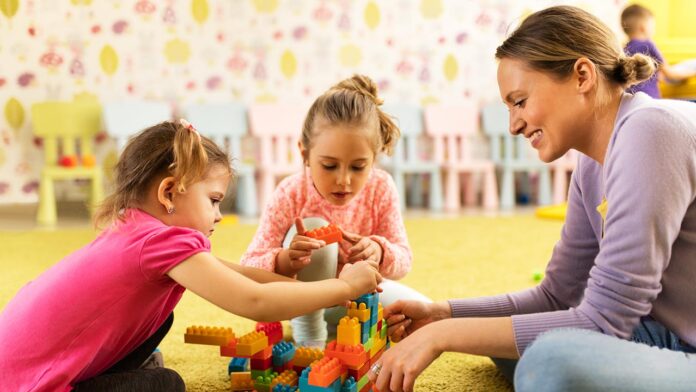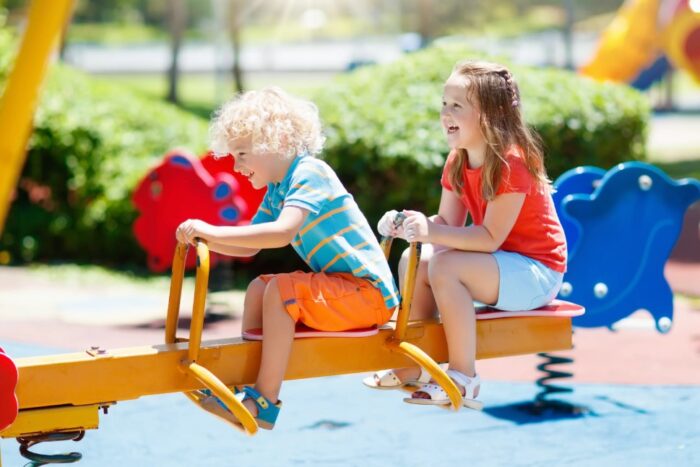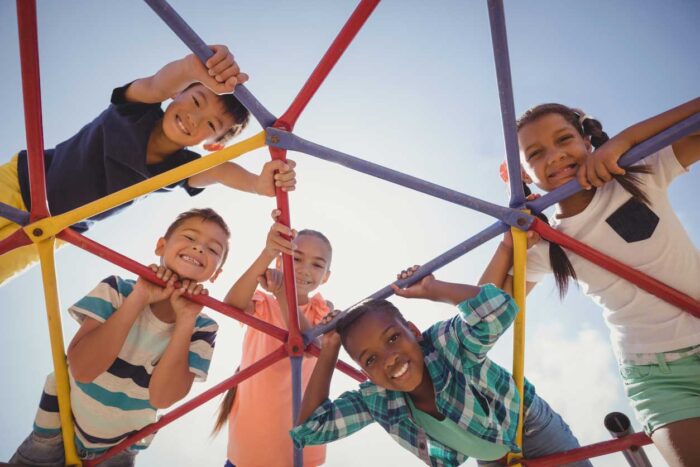
Social abilities are not merely a peripheral aspect of early childhood development; they are crucial. These skills lay the foundation for meaningful relationships, effective communication, and emotional well-being.
This article aims to delve deep into a significant catalyst for these abilities: play. We will explore various types of play and their distinct roles in enhancing young children’s social skills.
Why Social Abilities Matter
Social skills go far beyond the playground or the early classroom setting. These abilities have long-term benefits that can last a lifetime. For instance, children who excel socially are more likely to have better mental health and lower stress levels as adults. Strong social skills can also make it easier for kids to form lasting friendships and adapt to new environments.
It’s not just about personal well-being, though. Social abilities play a pivotal role in academic performance. Children who are socially adept often find it easier to collaborate on projects and engage in meaningful classroom discussions. Such skills can make a difference in settings like Little Scribblers Brookvale, where collaborative learning is part of the daily routine. Being able to work well with others is an asset that educators and caregivers value highly.
But the significance doesn’t stop there. In the professional world, social skills are among the top attributes employers look for. Effective communication, teamwork, and problem-solving are highly prized. These skills often differentiate those who merely do a job from those who excel in their careers.
Types Of Play

Understanding the various kinds of play can provide valuable insights into a child’s social development. Let’s take a closer look at three primary forms of play: solitary, parallel, and cooperative.
Solitary Play
Solitary play, as the name suggests, is when a child plays alone. This type of play is common among toddlers and is far from insignificant. It serves as a building block for self-sufficiency and imaginative thinking.
A child engaged in solitary play learns to entertain themselves and navigate the basics of problem-solving. These skills pave the way for future social interactions by helping the child become more self-reliant and imaginative.
Parallel Play
Parallel play involves children playing next to each other but not necessarily with each other. For instance, two kids might be building separate sandcastles side by side. At first glance, this may not seem very social, but it’s an essential step in the socialization process.
This form of play helps children become aware of their peers and learn the basics of sharing space and resources. It acts as a transitional phase that eventually leads to more interactive forms of play.
Cooperative Play
This is the stage where interactive play comes into full swing. Cooperative play involves kids actively engaging with one another. They may share toys, take turns, and even create rules for games. This form of play is a social skills goldmine. It teaches children about cooperation, negotiation, and empathy.
They learn to listen to others, work toward common goals, and resolve conflicts. These are all foundational skills that will serve them well in group activities and team settings throughout their lives.
The various types of play each have a unique role in bolstering social skills. Knowing this can guide parents and caregivers in creating well-rounded play experiences for children.
Role Of Outdoor Play

Outdoor play holds a special place in the realm of childhood experiences, particularly for social development. Whether it’s a simple game of tag or a more structured sport like soccer, these activities inherently require communication and cooperation.
As children shout out directions, strategize, or cheer each other on, they are actually refining their social skills. Sharing equipment like bats, balls, or frisbees also teaches them the valuable lessons of sharing and taking turns.
Moreover, outdoor play often comes with its own set of challenges that require problem-solving. Maybe the ball gets stuck in a tree, or perhaps a sandcastle keeps collapsing. These scenarios necessitate group brainstorming and collective action, enabling children to practice negotiation and compromise. Skills like these are critical for navigating social landscapes both in childhood and later in life.
The Power Of Indoor Games
Unlike their outdoor counterparts, indoor games often present more controlled environments. This structure facilitates a focus on mental agility, strategy, and social cues, providing fertile ground for lessons in empathy and cooperation.
Board games are more than mere entertainment; they are educational tools disguised as fun. Most board games require players to strategize, negotiate, and even form alliances to succeed. This means children need to understand their opponents’ perspectives and intentions, essentially honing their empathetic skills. Moreover, board games often necessitate turn-taking and rule-following, which subtly reinforces the principles of fairness and mutual respect.
Similarly, role-playing activities offer a multitude of social learning opportunities. In role-play scenarios, kids adopt various roles and viewpoints, which is an exercise in empathy in itself. For example, taking on the role of a doctor attending to a patient demands a level of compassionate interaction.
Practical Strategies

Making play an integral part of a child’s daily routine can be easier than it sounds. Below are actionable tips and game suggestions tailored to foster social skills.
Daily Play Time
Allocate a specific time each day solely for play. Whether it’s 30 minutes after school or an hour before bedtime, make this a non-negotiable part of the day. Consistency encourages children to anticipate and value playtime, making it a natural setting for practicing social skills.
Structured Vs. Unstructured Play
Balance is key. While structured games teach rule-following and teamwork, unstructured play allows kids to use their imagination and negotiate roles.
A simple game like ‘Simon Says’ can be fantastic for structured play, as it teaches kids to pay attention to cues and follow directions. On the flip side, a sandbox can serve as a canvas for unstructured play, where kids can create their own worlds and rules.
Game Suggestions
Before diving into the list, it’s worth noting that each game was selected with specific social skills in mind. Whether focusing on turn-taking, cooperation, or empathy, these games provide targeted opportunities for social growth.
- Duck, duck, goose ─ This classic game is excellent for teaching kids about turn-taking and listening skills.
- Charades ─ A family game night favorite, charades teach non-verbal communication and empathy as children have to ‘put themselves in someone else’s shoes’ to guess correctly.
- Building blocks ─ Simple yet versatile, building blocks can be either a solo or group activity. When used in a group setting, they encourage collaboration and spatial awareness.
- Board games ─ Opt for games that require teaming up, like ‘Pictionary’ or ‘Settlers of Catan.’ These games encourage negotiation and shared decision-making.
- Role-play scenarios ─ Use dolls or action figures to act out different social situations. This could range from a friendly chat to resolving a playground dispute, giving your child a safe space to practice social interaction.
By incorporating these tips and game suggestions into daily life, you offer your child a robust set of tools for developing their social skills.

Conclusion
The impact of play on children’s social abilities is too significant to overlook. The structured and unstructured settings, indoor and outdoor games, and specific activities all serve as building blocks for essential social skills.
Parents and caregivers, seize this opportunity. Infuse your child’s daily routine with meaningful play experiences. The social rewards they reap today will echo into their future, enriching their lives in ways both small and large.








